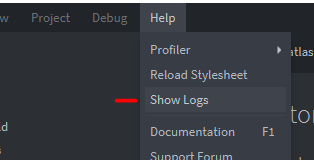I’m trying to make a game, but I got to some point where when I try to build (C-b or Ctrl+b), the game/engine crashes after about 5 seconds. I tried updating Defold but that did nothing to stop the crashes. What is happening, and is there any way to find out if the crash is happening because of some code I wrote, and if so can I found out where so I can fix it? Thanks.
FIXED - It turned out to be a weird bug in Lua itself, where the engine/language tried to iterate through an empty table, starting at index 1. This apparently caused the interpreter to time out, and I wrote a small script mimicking my code here to test it and got similar crash-like results. So, solution? I put a starting value in the table (outside the range I was trying to generate a number for).

